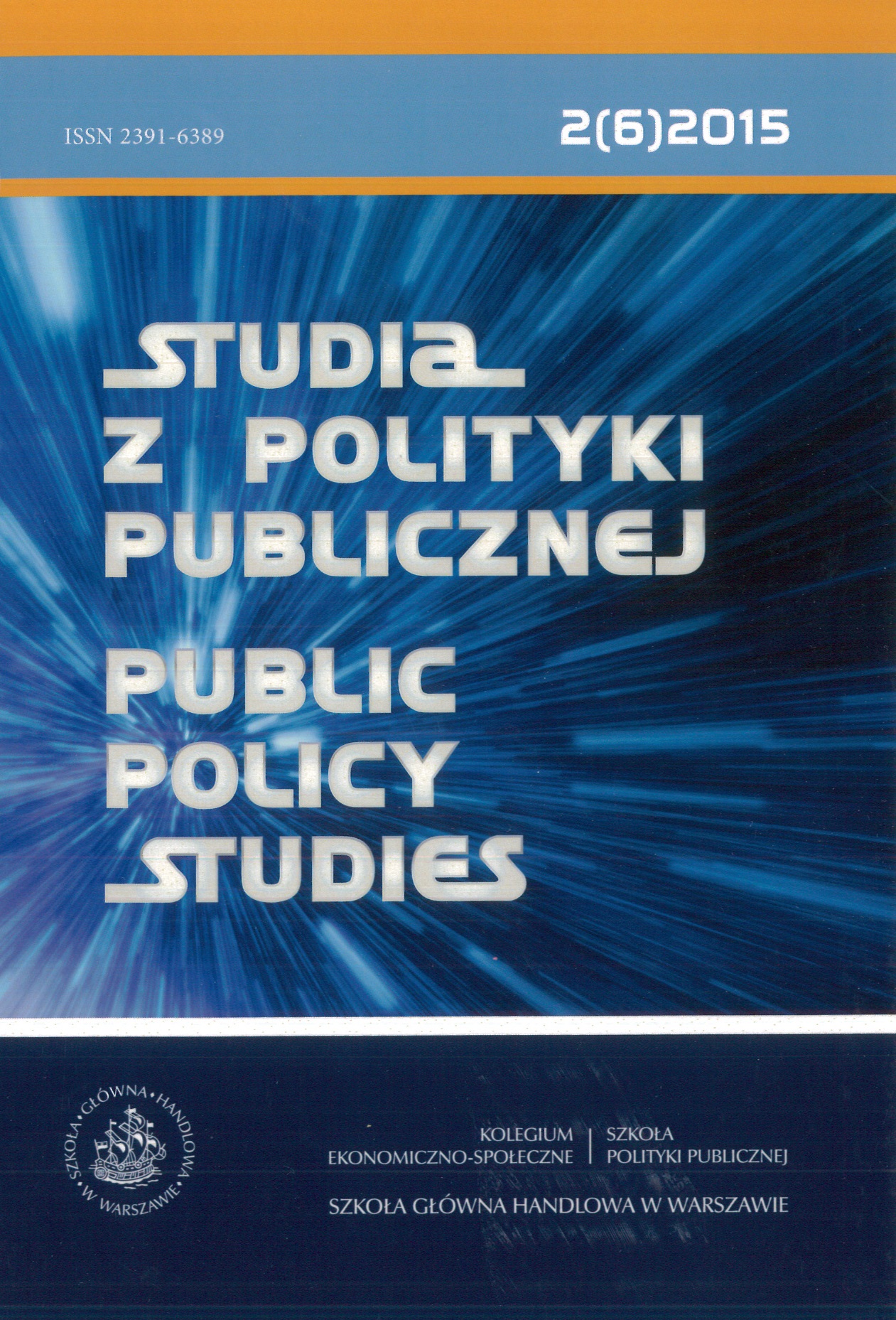Treść głównego artykułu
Abstrakt
Współcześnie ustroje wielu państw są opisywane jako ustroje państw prawnych, praworządnych czy demokratycznych państw prawnych. Zwykle zauważa się, że cechą państwa prawnego, inaczej niż w wypadku państwa rządzonego przez ludzi (np. rozkaz jednostki), jest to, że władzę sprawuje system abstrakcyjnych reguł, które kierują postępowaniem wszystkich ludzi (generalna norma) na jednakowych zasadach. Takie państwo działa na podstawie i w granicach prawa. Powyższe stwierdzenie odpowiada w zasadzie pojmowaniu państwa praworządnego. Państwo praworządne formalnie cechuje bowiem działanie na podstawie i w granicach prawa, zaś jego wymiar materialny oznacza, że prawo jest jednakowe (równe) dla wszystkich. Opis ten nie wystarczy dla scharakteryzowania państwa prawnego. Jest więc też tylko fragmentem opisu jeszcze szerszej koncepcji, jaką jest demokratyczne państwo prawne.
Słowa kluczowe
Szczegóły artykułu
Czasopismo „Studia z Polityki Publicznej/Public Policy Studies” zapewnia dostęp do treści artykułów w trybie otwartego dostępu (Open Access) na zasadach licencji Creative Commons Uznanie autorstwa 4.0 Międzynarodowe (CC BY 4.0).
Więcej informacji: Polityka Open Access czasopisma "Studia z Polityki Publicznej/Public Policy Studies"
Referencje
- Biernat S., Rozdział dóbr przez państwo. Uwarunkowania społeczne i konstrukcje prawne, [The Distribution of Goods by the State. Social Ramifications and Legal Constructions], Ossolineum, Wrocław 1989.
- Bosiacki A., Wstęp do Encyklopedii umiejętności politycznych [Preface to the Encyclopedia of political skills] by R. von Mohl, Liber, Warsaw 2003.
- Ehrlich S., Norma, grupa, organizacja [Norm, group, organization], Warsaw 1998.
- Frieske K., Sociology of law, Polskie Wydawnictwo Prawnicze Iuris, Warsaw 2006.
- Haack S., The Pluralistic Universe of Law: Towards a Neo-Classical Legal Pragmatism, in: Law and Legal cultures in the 21st Century. Diversity and unity, eds. T. Gizbert-Studnicki, J. Stelmach, Wolters Kluwer, Warsaw 2007.
- Izdebski H., Fundamenty współczesnych państw [Fundaments of the contemporary states], Warsaw 2007.
- Kość A., Podstawy filozofii prawa [The fundamentals of the philosophy of law], Lublin 2001.
- Mohl von R., Encyklopedia umiejętności politycznych [Encyclopedia of political skills], Liber, Warsaw 2003.
- Morawski L., Główne problemy współczesnej filozofii prawa. Prawo w toku przemian [The major problems of contemporary philosophy of law. The law in the stage of transformation], LexisNexis, Warsaw 2005.
- Oniszczuk J., A Selection of The Polish Constitutional Tribunal’s Jurisprudence from 1986–1999, Trybunał Konstytucyjny, Warsaw 1999.
- Rousseau J.J., Uwagi o rządzie polskim, w: Umowa społeczna [Remarks on Polish government], in: Social contract, Warsaw 1966.
- Sartori G., Teoria demokracji [Theory of the democracy], Warsaw 1994.
- Sobczak J., in: Polskie prawo konstytucyjne [Polish Constitutional Law], eds. W. Skrzydło, E. Gdulewicz, M. Grant, G. Koksanowicz, W. Krecisz, R. Mojak, W. Orlowski, S. Patyra, P. Sadowski, J. Sobczak, W. Zakrzewski, Lublin 2005.
- W. Sokolewicz, Rzeczpospolita Polska – demokratyczne państwo prawne [The Republic of Poland – democratic state ruled by law], PIP 1990, vol. 4.
- Staniszkis J., Niespełnione marzenie [Unfulfilled dream], „Rzeczpospolita” 2005, February 26–27.
- Witkowski Z., in: Z. Witkowski, J. Galster, B. Gronowska, A. Bien-Kacala, W. Szyszkowski, Prawo konstytucyjne [Constitutional Law], Toruń1998.
- Wroblewski J., Zasady tworzenia prawa [The rules of formation of law], Warsaw 1989.
- Viola F., The rule of Law in Legal Pluralism, in: Law and Legal Cultures in the 21st Century, eds. T. Gizbert-Studnicki, J. Stelmach, Warsaw 2007.
- Zakrzewski W.: Zakres przedmiotowy i formy działalności prawotwórczej [The Subject Matter and Forms of Lawmaking Activity], Warsaw 1979.
Referencje
Biernat S., Rozdział dóbr przez państwo. Uwarunkowania społeczne i konstrukcje prawne, [The Distribution of Goods by the State. Social Ramifications and Legal Constructions], Ossolineum, Wrocław 1989.
Bosiacki A., Wstęp do Encyklopedii umiejętności politycznych [Preface to the Encyclopedia of political skills] by R. von Mohl, Liber, Warsaw 2003.
Ehrlich S., Norma, grupa, organizacja [Norm, group, organization], Warsaw 1998.
Frieske K., Sociology of law, Polskie Wydawnictwo Prawnicze Iuris, Warsaw 2006.
Haack S., The Pluralistic Universe of Law: Towards a Neo-Classical Legal Pragmatism, in: Law and Legal cultures in the 21st Century. Diversity and unity, eds. T. Gizbert-Studnicki, J. Stelmach, Wolters Kluwer, Warsaw 2007.
Izdebski H., Fundamenty współczesnych państw [Fundaments of the contemporary states], Warsaw 2007.
Kość A., Podstawy filozofii prawa [The fundamentals of the philosophy of law], Lublin 2001.
Mohl von R., Encyklopedia umiejętności politycznych [Encyclopedia of political skills], Liber, Warsaw 2003.
Morawski L., Główne problemy współczesnej filozofii prawa. Prawo w toku przemian [The major problems of contemporary philosophy of law. The law in the stage of transformation], LexisNexis, Warsaw 2005.
Oniszczuk J., A Selection of The Polish Constitutional Tribunal’s Jurisprudence from 1986–1999, Trybunał Konstytucyjny, Warsaw 1999.
Rousseau J.J., Uwagi o rządzie polskim, w: Umowa społeczna [Remarks on Polish government], in: Social contract, Warsaw 1966.
Sartori G., Teoria demokracji [Theory of the democracy], Warsaw 1994.
Sobczak J., in: Polskie prawo konstytucyjne [Polish Constitutional Law], eds. W. Skrzydło, E. Gdulewicz, M. Grant, G. Koksanowicz, W. Krecisz, R. Mojak, W. Orlowski, S. Patyra, P. Sadowski, J. Sobczak, W. Zakrzewski, Lublin 2005.
W. Sokolewicz, Rzeczpospolita Polska – demokratyczne państwo prawne [The Republic of Poland – democratic state ruled by law], PIP 1990, vol. 4.
Staniszkis J., Niespełnione marzenie [Unfulfilled dream], „Rzeczpospolita” 2005, February 26–27.
Witkowski Z., in: Z. Witkowski, J. Galster, B. Gronowska, A. Bien-Kacala, W. Szyszkowski, Prawo konstytucyjne [Constitutional Law], Toruń1998.
Wroblewski J., Zasady tworzenia prawa [The rules of formation of law], Warsaw 1989.
Viola F., The rule of Law in Legal Pluralism, in: Law and Legal Cultures in the 21st Century, eds. T. Gizbert-Studnicki, J. Stelmach, Warsaw 2007.
Zakrzewski W.: Zakres przedmiotowy i formy działalności prawotwórczej [The Subject Matter and Forms of Lawmaking Activity], Warsaw 1979.
